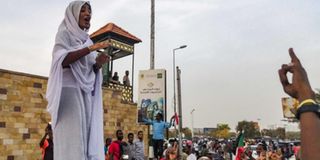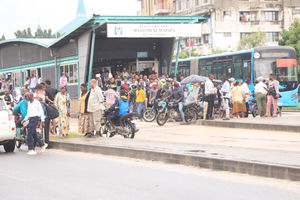WIND OF CHANGE: Why women led the uprising against Bashir

Alaa Salah, a Sudanese woman propelled to internet fame earlier this week after clips went viral of her leading powerful protest chants against President Omar al-Bashir, addresses protesters during a demonstration in front of the military headquarters in the capital Khartoum on April 10, 2019. - In the clips and photos, the elegant Salah stands atop a car wearing a long white headscarf and skirt as she sings and works the crowd, her golden full-moon earings reflecting light from the fading sunset and a sea of camera phones surrounding her. Dubbed online as “Kandaka”, or Nubian queen, she has become a symbol of the protests which she says have traditionally had a female backbone in Sudan. PHOTO|AFP
What you need to know:
Courageous, defiant and determined to participate in protests, Sudanese women are in fact continuing to assume roles they have historically played in their communities and country
The protests that have now led to the ouster of Sudan’s president, Omar al-Bashir, have been dominated by women. Day after day, on the streets of Khartoum, as many as two-thirds of those who turn out have been women. Photos of women - angry, defiant, now celebratory - have become the emblems of the uprising.
Various segments and groups of Sudanese society have taken part in the protests - and are still demonstrating out of concern that Thursday’s military coup will not usher in the freedom, justice or peace that the protesters seek. People from different political, ethnic, religious and social backgrounds have participated in the protests, culminating in a historic sit-in at the headquarters of the Sudanese Armed Forces. But women - always - have been at the forefront.
There is an overarching reason, stemming from the role of women in Sudanese society. But there are particular reasons, too: the ferocious oppression that women have experienced under Bashir’s government as well as the hardships that they felt as the economy deteriorated.
Throughout Sudan’s history, women have played a central role in society. In the ancient Sudanese Nubian kingdoms, women were queens and queen mothers, and they were referred to as “Kandakat,” or strong women. In the Darfur region, and western Sudan more broadly, women who write poems in support of virtues and traits such as bravery in times of war and generosity in times of peace have historically played a significant social and political role. This tradition has helped give strength to and inspire those leading the current uprising.
But perhaps a stronger motivation is the oppression that women, especially young women in Khartoum and other major cities, have experienced under Bashir’s government. Under the provisions of the public order law (passed in 1992 and amended in 1996), women have been arrested, detained, beaten and imprisoned for wearing indecent clothes, such as trousers or short skirts, going out with their male friends, or not covering their hair when in public.
Especially victimized by this law were women from poor communities who worked, for instance, as tea and food vendors.
Having typically fled conflict zones, they are more vulnerable than most and can rarely afford bail when arrested. Unlike women from affluent communities, they have not drawn much attention from the local or international media.
In conflict areas outside Khartoum, the oppression of Bashir’s government against women was more severe, as most of the human rights violations in these districts were committed against women and their children. They have been subjected to sexual violence by government forces or government-supported militias.
They have been driven from their homes and now live in miserable conditions in camps for internally displaced people in Darfur and elsewhere. It was because of this that displaced people, the majority of whom are women, joined demonstrations in support of the uprising.
As they took part in the protests, women were especially targeted by the security forces and the militias of the ruling National Congress Party. Women’s participation was itself an affront to the pro-Bashir forces, and stern action may have been designed to force the families of women to insist that they stay at home. But instead of accepting subjugation by Bashir’s security forces, women became more defiant and determined to continue.
Economic hardships may have further driven women to play a leading role in the protests because they shoulder most of the burden in maintaining the day-to-day finances of their families. They know that the economy is faltering under the weight corruption and nepotism. Whether staying at home to care for their children or working to contribute financial support to their families, women daily feel, more than men, how life is becoming difficult.
Their sons, brothers and husbands can leave the country to work abroad in the Gulf or elsewhere; and many do, because there are few employment opportunities in Sudan, and most of the jobs go to the supporters of the National Congress Party or to those with relatives in powerful positions in the government. But as women stay behind to care for their families, they have developed a stronger sense of obligation to challenge the government that has caused their suffering.
Courageous, defiant and determined to participate in protests in large numbers, Sudanese women are in fact continuing to assume roles they have historically played in their communities and country. Bashir’s government just gave them additional motivations to take to the streets, and for doing so, they have experienced the brutality of Bashir’s government.
As protesters continue their sit-in at the army headquarters, demanding a transition to a civilian government, they will face the possibility of a violent crackdown. But as one woman, named Wifag al-Gorashi, told the BBC about the torture and mistreatment she and other women endured: “We know why we have taken to the streets. No bad thing that happens to us can make us back down on what we are doing.”




